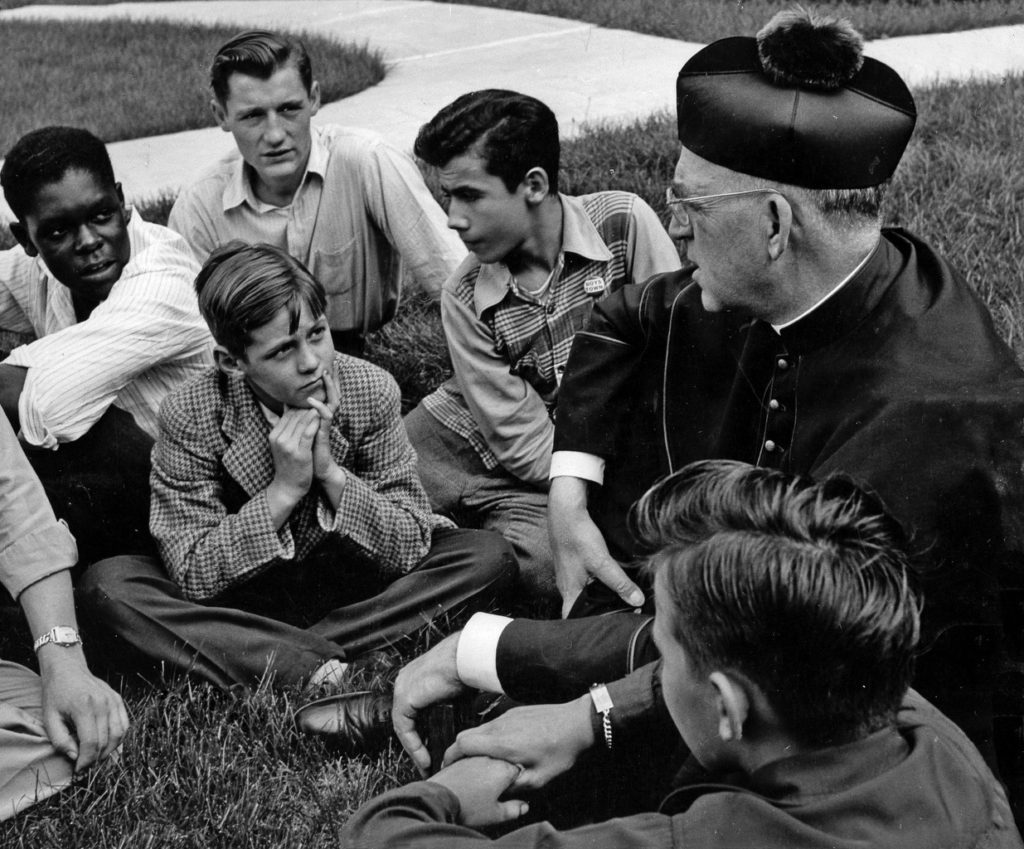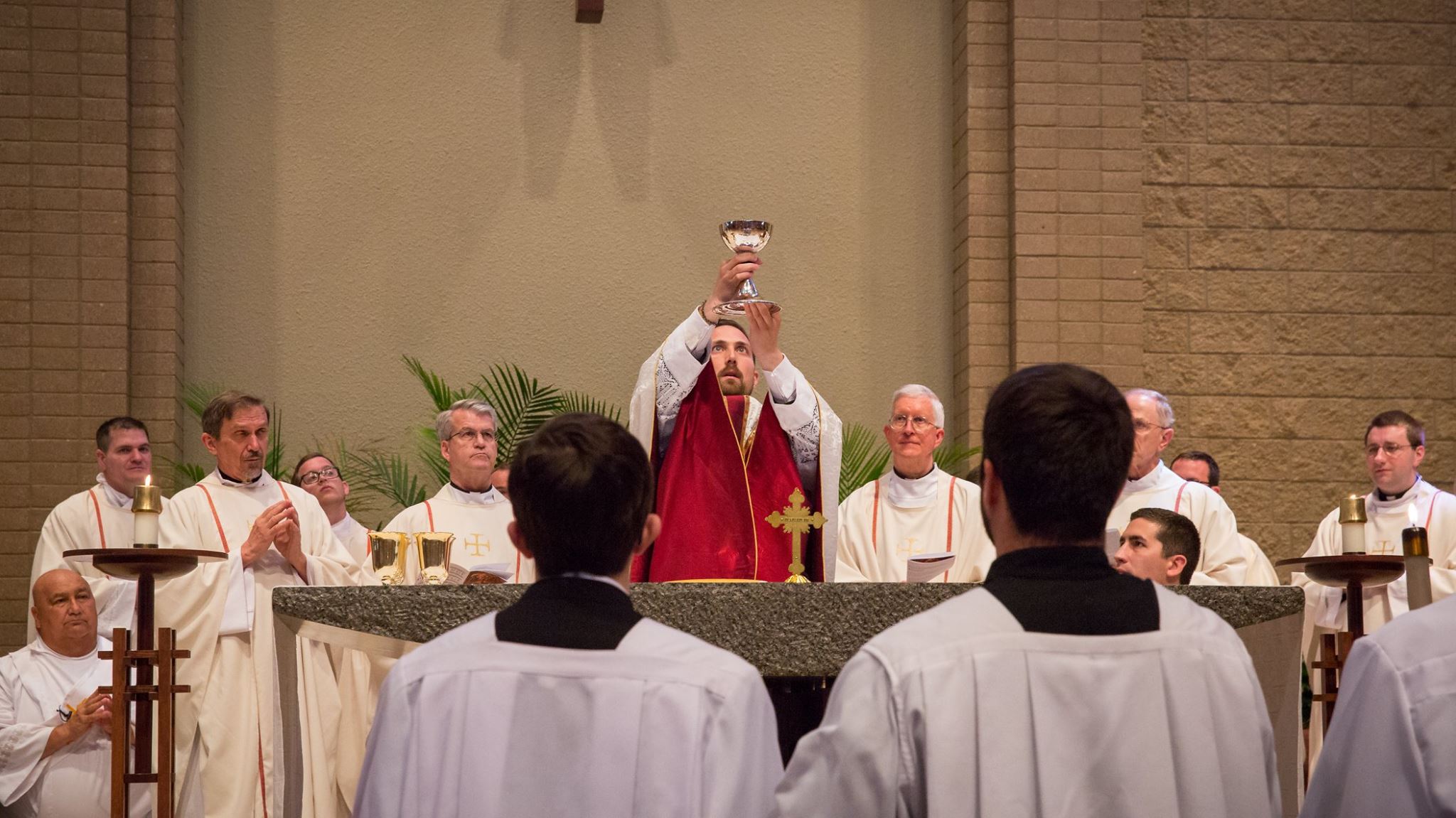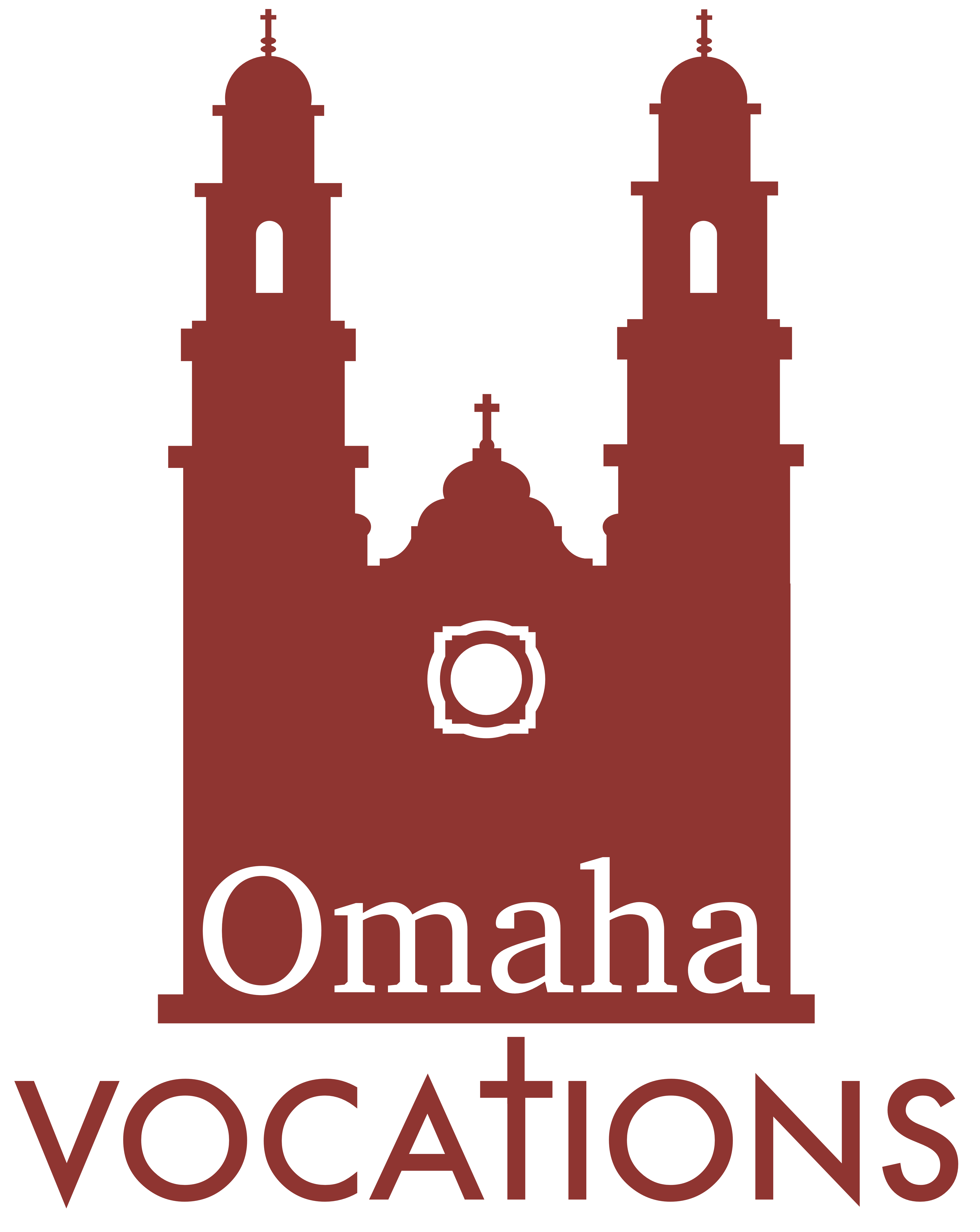Priesthood FAQ
Then I heard the voice of the Lord saying,
“Whom shall I send? Who will go for us?”
“Here I am,” I said; “send me!”
– Isaiah 6:8

1. What does a priest do?
The purpose of a priest is to bring people to Jesus, and Jesus to people. He does this primarily by preaching the Word and offering the Sacrifice of the Mass. His daily life involves administering the sacraments—Baptism, Confirmation, the Eucharist, Penance and Reconciliation, the Anointing of the Sick, and Matrimony (Holy Orders is reserved for bishops to administer)—and caring for the people in their daily needs.
2. What exactly is a "vocation"?
A vocation is a call from God to do something specifically for God and for His kingdom. The primary vocation of every person is to be holy! It is the divine calling to love and serve God, to obey His commandments, and to cooperate with Christ in the work of redemption by loving and serving others. But we are all called to a secondary vocation as well, a “state in life” in which we are to be holy.
3. What are some of these “secondary” vocations that I might be called to follow?
Many people are called to the vocation of marriage, but it is an error to automatically assume that this is your vocation. One may also be called to the vocation of the priesthood, to the religious life as a sister or brother, or to the diaconate. Finally, some follow Christ in the single state. Remember: It is normal to desire marriage and family. Just because you have this desire does not exclude the possibility that you have a vocation to the priesthood.
4. How do I know what God is calling me to do?
You must pray every single day, asking God to reveal His plan for you. Do not ask yourself, “What do I want to do when I grow up?” This is the wrong question! Rather, you should be thinking and asking: “Jesus, what do You want me to do?” And listen for the answer! The primary locus of revelation is the heart. Listen with your heart! The discernment process in the priesthood must also include the Church. The local bishop is the one who ultimately decides who is and who is not called. He is assisted in this by the vocation office and the seminary. This whole process is called “discerning one’s vocation.”
5. Can I be happy in my life if I do not follow God’s plan for me?
If you do not follow the vocation for which God made you, you can attain a certain degree of happiness in this world, and still attain salvation (go to heaven), but you can never be as happy as you might have been, had you followed your proper vocation. This is why it is so important that you discern correctly. Of course, there are trials and tribulations in every vocation. To become a priest does not take away all suffering. But there is great joy in laying down one’s life for Jesus!
6. Are most priests happy in their vocations—in their lives and in their work for Christ?
Most priests are extremely happy in their vocations! The life of a priest is a very rewarding life, both in this world and in the next. The media often gives an incorrect impression of priests… that they are largely unhappy, frustrated, and angry, or that most of them are sexual abusers. This is simply not true.
7. But why can’t priests get married? That must be very difficult.
Catholic priests in the Roman Rite do not get married so as to dedicate themselves completely to Jesus and to His people. Priests generate “spiritual children” by bringing many souls to Christ and helping them to grow in holiness so that they can one day live forever in Heaven. The sacrifice of celibacy (not getting married) is a sign to the world that only Jesus can give us the happiness that we all so crave. Giving up something as important as marriage and family is a powerful sign to the world that Jesus Christ is real! He is worth living for and sacrificing for. No, it is not easy, but neither is marriage. The fact is, every vocation requires great personal sacrifice. And there is great joy in sacrifice when it is done for Jesus and for others! As one priest said: “It is true that no one will ever call me ‘daddy.’ But thousands call me ‘Father.’”
8. Will priests ever be allowed to get married?
Celibacy will always be practiced in the Church because it has been there from the beginning. It is not just a law, but also a charism – a spiritual good, an ideal, and a special source of fruitfulness for the Church. Jesus Christ, our Founder, was celibate. St. Paul was celibate. Celibacy is also a place of great value for the man’s own holiness and serves as a living testimony of the Kingdom of God breaking into the world through his own life. There are some married priests in the Catholic Church, though this is relatively rare. It is possible that the law of the Church will one day be changed for priests of the Roman Rite. If the Holy Spirit wants the law to change, He will effect it through the Pope and bishops of the world. However, it would be a grave mistake to go to the seminary “expecting” this change. That would be setting oneself up for a big disappointment, should it not happen.
9. Don’t you think more men would become priests if they could get married? Wouldn’t that solve the priest shortage?
Perhaps more men would choose the priesthood, but the question is, “Would this be what is best for the Church?” As said above, celibacy for the sake of the Kingdom is a powerful sign that Jesus is real! And that He is worth living for, sacrificing for, and dying for. Besides, in the world as a whole, vocations to the priesthood and religious life have dramatically increased in the last thirty years. In Africa, they increased by 394%; in S. E. Asia, by 152%; in Central America, by 165%; and in South America, by 253%! In contrast, in the U. S. and in Western Europe, they dropped by 60% and 13%, respectively. The problem is not the requirement of celibacy; there are more complex social dynamics at work.
10. Will I be lonely if I become a priest?
Loneliness is a part of every vocation, at one time or another. It is part of the human condition. Married people get very lonely at times, even though they are surrounded by their spouses and children. Priests are always surrounded by people. This is one of the joys of being a priest. We are involved with people at the most profound moments of their lives: birth, Baptism, Confirmation, First Communion, Marriage, and death. We don’t have enough time to experience loneliness often! But when we do experience loneliness, Jesus can fill that void, as He does for people in every vocation.
11. Do priests get paid?
Because a priest does not have a family and because he lives a simple life, he does not need a lot of money. However, priests do receive enough money to buy their necessities, to buy and maintain a vehicle, to take a vacation, and to do normal recreational activities. Also, priests are given free room and board by the church for which they work, so their expenses are minimal.
12. Can priests do anything they want for recreation and fun?
A diocesan priest can do anything he wants for recreation, as long as it is consistent with the Christian life. Many priests play golf, basketball, softball, scuba dive, and engage in other sports. Others enjoy moives, plays, and reading. Some like to hunt and fish! The interests of priests are as varied as the interests of the general public.
13. If I am attracted to the priesthood, does that mean that God is calling me to be a priest?
Possibly, but not necessarily. A man must pray a great deal, listening with both heart and soul to know what God wants him to do. But if you feel some attraction at this point, just continue to pray, go to Mass, and live a Christian life. If you are living a Christian life, Jesus will let you know when the time comes. Also, go talk with your parish priest or with the vocation director. Try to come to the diocesan-sponsored retreats and discernment events. The vocation director can help you determine if God is calling you to the priesthood.
14. I’m not all that “holy.” Can I still be a priest if I’m not very holy?
Holiness (to be like Jesus) is a lifetime endeavor for every person in every vocation. Don’t worry if you don’t see yourself as very holy right now. God will form you slowly, day by day and week by week, so that you will be ready to be His instrument when the time comes. But for now, use the sacrament of Penance at least once a month. Repent of your sins, receive the sacraments, and pray every day. You will be surprised at how Christ-like you can become!
15. Is it easy to become a priest?
No, it is definitely not easy! A man who wants to become a priest must go to college for four years, with at least two years of philosophy. After graduating from college, he must go to a seminary for another four years to earn a master’s degree in divinity. Most men go to school eight to ten years after high school before they can be ordained as priests! But do not let this discourage you. Seminary is a fantastic experience! And God always gives us the grace to do what He asks us to do.
16. Is all this education necessary?
It is very important for a priest both to have a well-balanced liberal arts education as well as a deep grasp of theology and the spiritual life. Priests must be at least as well educated as the people they serve; otherwise, they will not be respected when they speak of spiritual things. Every soul is precious to God and, therefore, to the priest. A priest is called to help the most educated as well as the least educated to find Jesus and to attain salvation.
17. What are the qualities that the Church looks for in a candidate for the priesthood?
A good candidate is a practicing, believing Catholic. He attends Mass at least weekly, prays daily, obeys the commandments, and tries to serve others. He must be mentally, emotionally, and physically healthy. He must be of at least average intelligence. And finally, he must be open to the will of God. Do you have these qualities?
18. If I decide to go to the seminary to “give it a try,” am I committed for life?
In no way! In fact, most vocation directors will say that the only way to really know that you have a vocation to the priesthood is to go to the seminary and try. It will become more and more clear to you once you are in an environment where everyone is trying to discern that same question. Many men go to the seminary, stay a year or two, and then leave. They are much better Catholics afterwards for the experience!
19. Is the daily life of a priest interesting?
There is never a dull moment in the priesthood! It is a great challenge but it is also extremely rewarding. When a priest goes to bed each night, he can say, “Lord, today I spent myself for You.” What a wonderful thought with which to end one’s day! The priesthood is both interesting and fulfilling because people are so interesting. But these people need more priests very badly.

